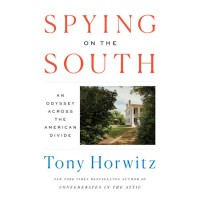Read it

America lost something great when Tony Horowitz died in May 2019. When you read this book, you are made painfully aware of that fact. Horowitz possessed not only ability to get people to talk to and with him, but also to capture them on the page. Reading this book, you realize how rare and powerful that skill is.
Spying on the South is on one level a recreation of Frederick Olmstead’s journey to report on the South prior to the Civil War. Much of it was done during the 2016 election, and, therefore, the book also shows the divided country.
His journey starts on Amtrak’s Capitol limited which follows the old B&O route. The reader is quickly treated to a wonderful conversation with Donald Handy, a salesman who not only is a good salesman but also compares writing to his work. In West Virginia, Horowitz examines the coal industry, and how coal, or perhaps the memory of coal, still runs the state. He includes as well the men who run the ships who move the coal. What Horowitz does in the book is capture what people say and think, but with a minimum of judgement. This is perfectly done in the section about coal where Horowitz represents the declining coal industry as well as the desperation of those who used to work in.
The great thing about Horowitz is that he is able to change the stereotype that many people have of the South (and of the North because he represents the North). He shows us a West Virginian who points out that coal is a legacy of exploitation and is a class issue. He is upset and worried that his state is ruled by coal, that in some ways they have given up their independence. There are Texans who point out the those at the Alamo were the illegal immigrants of their day and that it is something we should remember.
His even-handed approach is so prevalent that when the word bigoted is used to describe someone’s rhetoric, it stands out. It makes the description more powerful because it is used so sparingly.
One of the most interesting and telling aspects of Horowitz’s trip is when he boards the American Queen, a tourist cruise boat that goes down the Mississippi river. The cruise includes day trips to plantations and most strangely, disturbingly to Angola Prison. The reflection of how many, not all but many, of the stops gloss over slavery as well as the sense of a caste system on the boat take up much of this section and raise some very good points about how we cover history.
This conflict about reality and history also includes forgotten massacres that are remembered but not really, including people in Texas who were actually pro-Union and killed for it during the Civil War.
When you reach the end of this book, you are left wishing Horowitz was still alive to write more because while he records the bad, he also records the good and that gives us hope.








